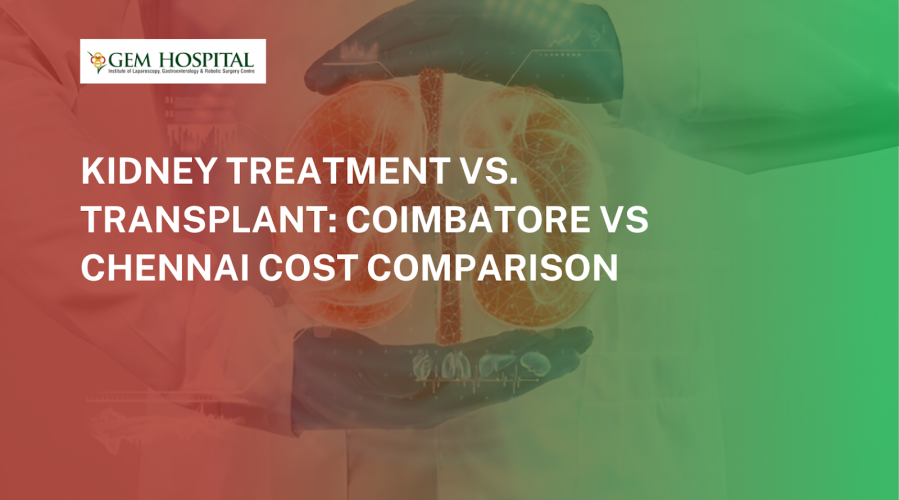Discover the latest advances in liver and kidney treatment at GEM Hospitals in Chennai and Coimbatore. Learn how our cutting-edge care and expert specialists set us apart from other healthcare providers.
Sweating and Dehydration: How It Affects Your Digestion

When we think about the effects of sweating, we’re likely to think either of losing fluids while exercising, or of our body using sweat to cool us down. Yet what some people may not realize is the extent to which the act of sweating is closely tied to digestive issues. Appropriate fluid balance is important to orderly digestion. If dehydration is the cause—usually brought on by a bout of sweating illness—it can result in a plethora of uncomfortable and unhealthy gastrointestinal issues.
symptoms of digestion issues caused by dehydration or sweating:
- Bloating after meals
- Acid reflux or heartburn
- Constipation or hard stools
- Nausea or reduced appetite
- Stomach cramps or discomfort
The Role of Water in Digestion
From helping grind up food in the mouth to assisting in nutrient absorption in the intestines, fluids are crucial at every turn. To break down and absorb that food, your body needs the good kind of water to produce saliva, stomach acid and digestive enzymes. However, when your body isn’t hydrated, these functions take a backseat, causing symptoms such as constipation, bloating and malnourishment.
How Sweating Leads to Digestive Discomfort
Heavy sweating can also occur, whether due to physical exertion, exposure to heat or medical problems such as hyperhidrosis, leading to fast fluid loss. This has a lot to do with blood pressure and energy levels, but also has to do with gut health. Dehydration can decrease the water content of the mucus lining the stomach, thus making it more susceptible to acid irritation. That's when sweating and digestive problems can become a problem.
When you are dehydrated, your body focuses more on other necessary functions, such as heart and brain activity, and less on digestion. So, your digestive function grinds to a halt. Your bowel can be a bit slower, the poo more solid, and you are more prone to acid reflux/indigestion. All of these have one common denominator: sweating and the digestive issues causing fluid imbalance.
Electrolyte Imbalance and Gut Function
Sweating not only causes water loss, but also robs your body of electrolytes essential to normal body function, including sodium, potassium, and magnesium. These minerals are essential for muscle function, including those in your gut. If we don't have these electrolytes can even throw peristalsis (the wave motion movement of food through the intestines) off leading to slow digestion and bloating.
This is another place where sweating and digestive problems intersect. Individuals who participate in consistent strenuous activity or who reside in hot climates are particularly at risk for this shift in balance. You could argue that even a perfectly healthy digestive system wouldn't be at its best if it’s not getting hydrated and receiving new electrolytes.
Recognizing the Warning Signs
Symptoms of Dehydration Causing Digestive Issues Symptoms of dehydration and digestive problems can vary from mild to severe conditions. Be on the lookout for symptoms such as dry mouth, dizziness, reduced production of urine and constipation. When the two conditions also come with a fair amount of digestive issues, it's time to consider how sweating is influencing your gut health.
Tackling sweating and digestion problems while they are in their infancy can help avoid long-term issues. Simple things such as drinking water and electrolyte-filled drinks and not getting too hot can be a big help. Athletes or individuals with medical conditions involving large amount of sweating are advised to seek professional advice.
Don’t Ignore Persistent Digestive Discomfort
If you’re experiencing frequent or mysterious digestive health problems — particularly when you’re also constantly sweating or feeling dehydrated — the best advice is to speak to a healthcare professional. Irritable bowel syndrome (IBS), acid reflux, and chronic constipation are just a few conditions that may exacerbate when not drinking enough water. Our team of gastroenterologists at Gem Hospital can help you determine, and treat the source cause.
Don’t allow dehydration and digestive troubles to stop you. Schedule an appointment now at Gem Hospital and give your digestive health a priority.
Blogs & Article
Find the best liver transplant centre near you with our comprehensive guide for patients in Chennai and Coimbatore. Learn how to choose a reliable centre for safe and effective treatment.
Compare the cost-effectiveness of kidney treatment versus transplant in Coimbatore and Chennai. Learn which city offers better options for kidney care and transplantation.


